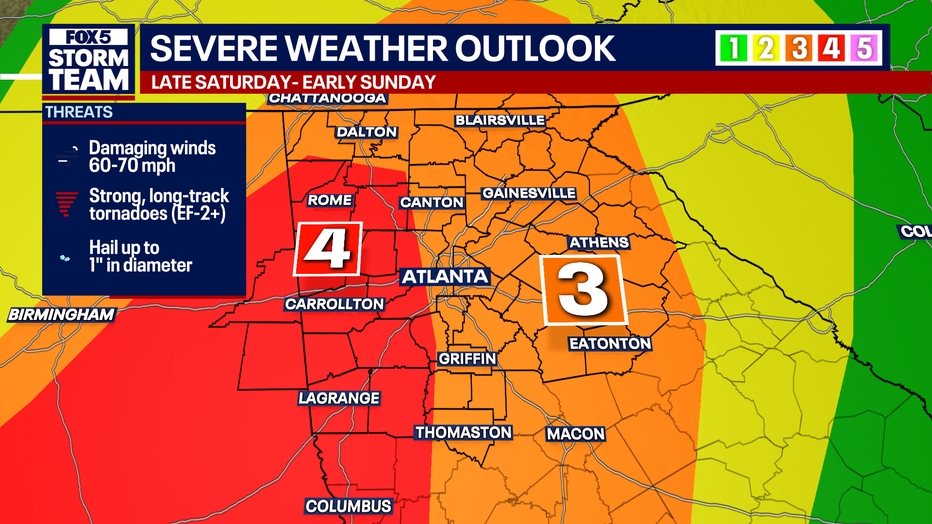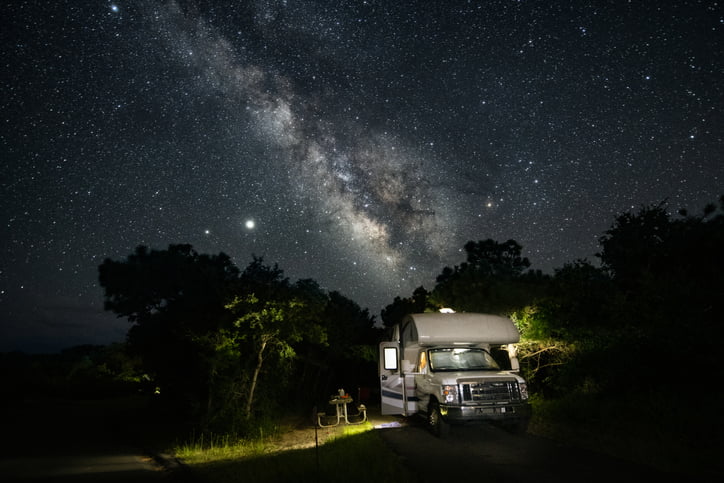Georgia residents—especially in Atlanta and North Georgia—brace yourselves for a rough ride as severe storms are set to roll in overnight from Sunday into Monday. If you’re planning to wind down your Sunday evening, you may want to rethink it. The storm will bring a dangerous combination of heavy rain, strong winds, frequent lightning, and a risk of tornadoes that could last well into Monday night.
Here’s everything you need to know to stay safe, because this isn’t your average spring thunderstorm.
What’s Coming Your Way: The Full Breakdown of the Storm
This storm is shaping up to be a major weather event, and it’s important to know exactly what to expect as it moves in.
Heavy Rain and Flash Flooding
Rain will begin to fall across Georgia late Sunday, but it won’t be light. Expect 1-2 inches of rain in many places, with some areas seeing more. Flash flooding is a real concern, especially in areas that tend to flood easily. Streets, highways, and underpasses may be swamped, and drivers will face hazardous conditions. If you live near rivers, creeks, or in low-lying areas, keep an eye on water levels—they can rise quickly and unexpectedly.
Strong Winds
Along with the rain, winds will be brutal. Gusts of 60-70 mph could be enough to bring down trees, power lines, and debris. The risk of power outages is very real, so make sure you’re prepared. If you’re out driving, be ready for sudden gusts that could make it difficult to keep control of your vehicle.
Thunderstorms and Lightning
The storm will also come with frequent lightning and thunder, which could make things even more intense, especially if you’re trying to sleep. It’s not just noisy—lightning can also spark fires and cause injuries. If you’re caught outside, get indoors quickly and stay away from windows.
Tornado Risk
The possibility of tornadoes is another major concern. Though not every storm leads to a twister, this one has the right ingredients for it. The greatest risk is in western and northern Georgia, but the entire area should remain alert. Tornado watches are likely, and if a warning is issued for your area, don’t hesitate to take shelter immediately.
When Will the Storm Hit?
Let’s break it down by time so you can be ready for when the worst of it comes:
-
Late Sunday Night: The storm will move in, bringing rain and gusty winds first. By midnight, the storm’s intensity will increase.
-
Monday Morning: This is when things will get wild. The heaviest rain and strongest winds will hit Georgia in the early hours of Monday. Flash flooding will be a concern, so it’s a good idea to avoid unnecessary travel during this time.
-
Monday Afternoon and Evening: While the storm may start to lose some of its strength by Monday evening, conditions will still be dangerous. Keep monitoring updates throughout the day.
Tips to Stay Safe
We don’t want to scare you, but this is serious—so let’s make sure you’re prepared for what’s coming.
1. Stay Informed
Check weather updates frequently—this storm will be unpredictable at times. Having a reliable weather app, tuning in to the radio, or turning on local news can help you stay ahead of any tornado watches or warnings. Set your phone to receive emergency alerts so you don’t miss any crucial warnings.
2. Secure Your Home
Before the storm really gets going, take some time to secure your home. Close all windows tightly, move any outdoor furniture or debris inside, and double-check that your storm drains are clear to help with water flow. If you have a basement or safe room, make sure it’s accessible and ready to go if a tornado warning is issued.
3. Avoid Driving
Unless absolutely necessary, don’t drive during the storm. Even though Georgia’s roads will likely be packed with rainwater, you may not be able to tell where flash flooding is happening. Low visibility and falling trees could make it hard to see hazards. If you’re already out and about, slow down, turn on your headlights, and avoid any water-covered roads.
4. Prepare for Power Outages
Winds strong enough to take out trees and power lines will likely lead to power outages. Charge your phone and any backup devices ahead of time. Have a flashlight and extra batteries handy. If you rely on medical equipment that needs power, make sure you have a backup plan in place. Don’t wait for the lights to go out—be proactive.
5. Have a Weather Kit Ready
It’s always a good idea to have a weather emergency kit ready to go. This should include things like bottled water, non-perishable food, medications, a first-aid kit, and anything else your family needs to survive a few days without power. A battery-powered radio could come in handy, too, for those areas where phone service might go down.
Stay Alert, Stay Safe
The storm rolling in is a serious one, but the more prepared you are, the safer you’ll be. Keep an eye on the forecast, stay updated on weather alerts, and make sure your family has everything they need to stay safe.
While the storm will bring heavy rain, strong winds, and possible tornadoes, you can get through it by staying informed, preparing your home, and making sure everyone knows what to do in the event of a power outage or tornado warning. The key here is don’t panic, but don’t take any chances either.
So, if you’re in Atlanta or North Georgia, make sure you’re ready for a wild ride. This is one storm that’ll certainly make a statement—but with the right precautions, you can come out on the other side just fine.



